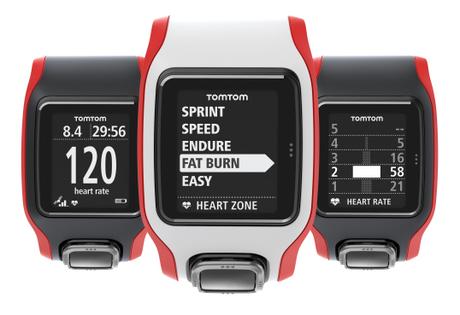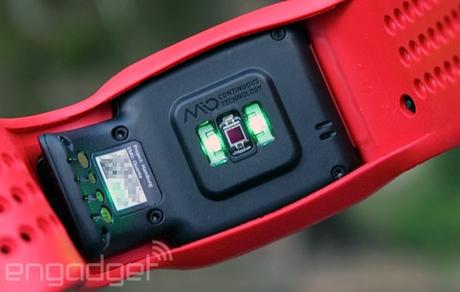It’s no secret that I’m a bit of a gear head, and love all of the running technology available to us today. As a faithful Garmin user, I’ve had little experience with other GPS watches. Thus, when a friend purchased the Tom Tom Cardio, I was eager to hear his thoughts on the watch. Below is his review.
_____________________________________________
Guest Review: Tom Tom Cardio
Four years ago I got a surprise package in the mail from my parents which turned out to be the Garmin Forerunner 405. It was my first GPS watch, and suddenly my running life was changed forever. Gone were the days of consistent “free running” as I loved being able to track my distance and pace. As I’m sure many can relate, it could be both exciting and disappointing, depending on the run.
This past winter, though, I could tell the Forerunner was on its last legs and, with training for my first marathon around the corner, I thought it might be time for an upgrade. After scouring through online and friends’ reviews of GPS watches, I ultimately decided on the TomTom Cardio. What drew me to the TomTom watch was, first and foremost, that it had an accurate GPS tracker, which is obviously most important to all runners. What enamored me about it further was the built-in Heart-Rate monitor, which was reportedly very accurate.
I must say, jumping four years in watches was a big difference. Imagine going from one of those original Blackberry phones to an iPhone. Similar qualities, but big differences. The Forerunner had some features I didn’t use, specifically the GPS tracker which could (I think) tell you where you actually were. I would imagine you would use this for Geocaching. It also had that pesky touch bezel (more on that later). The Cardio has lots of features I assure you that I will probably never touch. It also has some that I might use someday down the line. But let’s start with the basics.
Setting up the watch to run is vastly simpler. I simply have to touch right twice on the touch pad thing just below the screen. That sets up the GPS tracker and the heart-rate monitor. Picking up signals is hit or miss. I’ve literally ranged from picking up a signal in 10 seconds to 10 minutes. I haven’t figured out a reason why it takes so long yet, since most of my runs leave from the same place. I’ve simply learned to fire the watch up when I decide to go run, as opposed to when I’m walking out the door.
The screen while running is also extremely customizable, which is great. It gives you one set of information large on the screen, and two smaller. Personally, I have time as my big one, overall pace and distance as my small ones. Other options include current pace, overall heart-rate, and current heart-rate. You can mix and match any of these features, which is pretty neat.

To pause the watch, you have to click/push left on the touch pad. The default setting is to hold it down for a second or two, so you prevent bumping it and accidentally pausing your workout without knowing it. The pause screen only shows heart rate, which I would like to try and change. But at the same time, it’s nice to see what my heart-rate is if I have to stop at an intersection. To end your workout, just touch left again. Super simple.
Another aspect I love about the watch is that it doesn’t beep at every mile. I know some runners enjoy their watch letting them know each mile has passed. Me? Not so much. If you like knowing every mile that you hit, though, you can turn this feature on. It’s called the lap feature, and it’s also customizable. So if you’d rather have your watch beep every 5k, for example, you could set that instead.
Another setting is the tempo feature, which I haven’t tried out. Let’s say you want to run your next 5k at a 7 minute per mile pace, you can set the Cardio to that setting. If you deviate too much from that pace, the watch will beep at you until you get back to that pace. This could be a great feature, especially if you’re big into tempo runs. I’m not a big tempo run person, so I rarely venture into this area of the watch.
Yet another feature (so many things on the watch!) is that of the race setting. Let’s say you have a time goal of running a 42 flat in a 10k. You can set the Cardio to “pace” you to the finish. This is similar to the tempo feature. This will tell you your pace, distance run, and distance to the finish. It also has a finish line on the watch as you get closer.
Finally, I want to delve into the heart-rate tracker. I mentioned this was what put the watch over the top for me. I wouldn’t say I was ever curious about my heart-rate before, but this watch is slowly changing that. I love that it’s automatic, and takes heart-rate through the wrist, instead of with a strap-on chest piece. Over time, I’ve started to look at my heart-rate more and more, specifically after I run. I don’t train by it, like some people, but I now have a very good idea about what it should be during a run. I’ve found it especially interesting to go back to races, or workouts, on Strava (and yes, that’s a shameless plug for you to follow me) and look at my heart-rate. In areas of the race where I either felt great, or not-so-great, I can easily see that reflected in my heart-rate.

Heart rate monitor- Photo Credit: Engadget
So far I like the Cardio a lot. It’s very comfortable to wear, easy to use, and it doesn’t freak out if I randomly touch it or get it sweaty, like the touch bezel did. All in all, I would give it a 4.5/5. It doesn’t get a perfect 5 for two reasons. It can be a bit frustrating when the GPS doesn’t pick up right away, and because it is much more than I thought I would ever pay for a running accessory (and that’s entirely because of the heart-rate monitor).
____________________________________________
You can find Ben hitting the roads and trails around Ames when he isn’t jet-setting around the country, trying to convince high school students to attend Iowa State. He is currently training for his first marathon, Grandma’s Marathon in Duluth, on June 20th.
